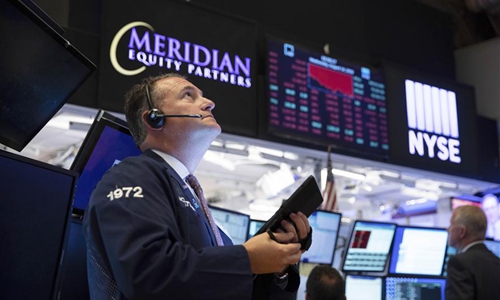HOME >> SOURCE
US stock market sees worst week since 2008; expert predicts downtrend to continue
By Wang Bozun Source:Global Times Published: 2020/3/21 13:48:40

A trader works at the New York Stock Exchange in New York, the United States, on August 14, 2019. Photo:Xinhua
Wall Street has just seen its worst week since the 2008 financial crisis, with major US benchmarks witnessing steep plummets amid panic over the spread of the novel coronavirus (COVID-19) worldwide, despite a series of measures released by the US Federal Reserve.
On Friday, the Dow Jones Industrial Average and the S&P 500 decreased more than 4 percent after New York and California imposed restrictions on movement to contain the virus, which fueled worries about damage to the US economy.
The Dow has now dropped 17.3 percent since Monday, the S&P 500 has plummeted 14.9 percent and the NASDAQ has sunk 12.6 percent, marking the biggest weekly drop in the US stock market since 2008.
As the pandemic situation in the US is not likely to be eased within a short time, its stock market may see further fluctuations in the following weeks due to the panic brought by the virus, Liu Xuezhi, an economist at the Bank of Communications, told the Global Times on Saturday.
Although the Fed this week released several urgent measures in an attempt to save the stock market and stimulate economic growth, including lowering interests and quantitative easing, the market has not responded positively.
On Friday, the Dow saw a "death cross" - a pattern that occurs in a chart when the 50-day moving average, which many chart watchers use as a short-term trend tracker, drops below 200-DMA, a point that is widely viewed as a dividing line between long-term uptrends and downtrends.
"The Dow's 'death cross' is a sign that investors lack confidence in the US economy, indicating that at least in the short run, the plummeting trend will not be eased as the panic spreads," Liu said.
Fears over the virus are the major cause of the plunge; That's the reason the stock market kept dropping despite the measures released by the Fed, Liu noted.
Liu predicted the US stock market will fluctuate in the coming weeks until the pandemic situation is eased, similar to how China's A-share market has been stabilizing as the virus comes under control in the country.
Posted in: MARKETS,BIZ FOCUS